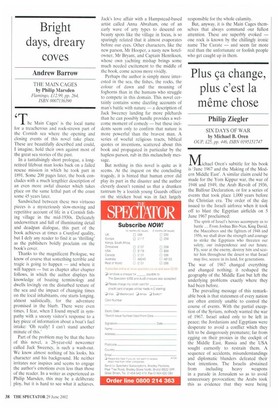Bright days, dreary coves
Andrew Barrow
THE MAIN CAGES by Philip Marsden Flamingo, £12.99, pp. 264, ISBN 0007136390
The Main Cages' is the local name for a treacherous and rock-strewn part of the Cornish sea where the opening and closing events of this novel take place. These are beautifully described and could, I imagine, hold their own against most of the great sea stories of the past.
In a tantalisingly short prologue, a longretired lifeboat man looks back on a failed rescue mission in which he took part in 1891. Some 200 pages later, the book concludes with a much lengthier description of an even more awful disaster which takes place on the same lethal part of the coast some 45 years later.
Sandwiched between these two virtuoso pieces is a mysteriously slow-moving and repetitive account of life in a Cornish fishing village in the mid-1930s. Delicately underwritten and full of illuminating detail and deadpan dialogue, this part of the book achieves at times a Cranford quality, but I defy any reader to find it as 'thrilling' as the publishers boldly proclaim on the book's cover.
Thanks to the magnificent Prologue, we know of course that something terrible and tragic is going to happen — and where it will happen — but as chapter after chapter follows, in which the author displays his knowledge of boating terminology and dwells lovingly on the disturbed texture of the sea and the impact of changing times on the local inhabitants, one starts longing. almost sadistically, for the adventure promised in the blurb. There were even times. I fear, when I found myself in sympathy with a snooty visitor's response to a key piece of information about a boat's fuel intake: 'Oh really! I can't stand another minute of this.'
Part of the problem may be that the hero of this novel, a 28-year-old newcomer called Jack Sweeney, is such a wash-out. We know almost nothing of his looks, his character and his background. He neither irritates nor inspires and seems to engage the author's emotions even less than those of the reader. In a writer as experienced as Philip Marsden, this may be a deliberate ploy, but it is hard to see what it achieves. Jack's love affair with a Hampstead-based artist called Anna Abraham, one of an early wave of arty types to descend on beauty spots like the village in focus, is so sparingly related that it almost evaporates before our eyes. Other characters, like the new parson, Mr Hooper, a nasty new hotelowner, Mr Bryant, and Captain Henriksen, whose own yachting mishap brings some much needed excitement to the middle of the book, come across more vividly.
Perhaps the author is simply more interested in the sea, the fishes, the rocks, the colour of dawn and the moaning of foghorns than in the humans who struggle to compete in this domain. This novel certainly contains some dazzling accounts of man's battle with nature — a description of Jack Sweeney landing far more pilchards than he can possibly handle provides a welcome moment of comedy — but these incidents seem only to confirm that nature is more powerful than the bravest man. A series of woeful religious tracts, biblical quotes or inventions, scattered about this book and propagated in particular by the hapless parson, rub in this melancholy message.
But nothing in this novel is quite as it seems. At the inquest on the concluding tragedy, it is hinted that human error did play its part in the disaster and the author cleverly doesn't remind us that a drunken tantrum by a loutish young Guards officer on the stricken boat was in fact largely
responsible for the whole calamity.
But, anyway, it is the Main Cages themselves that always command our fullest attention. These are superbly evoked — one rock is known by the chillingly ironic name The Curate — and seem far more real than the unfortunate or foolish people who get caught up in them.


































































 Previous page
Previous page